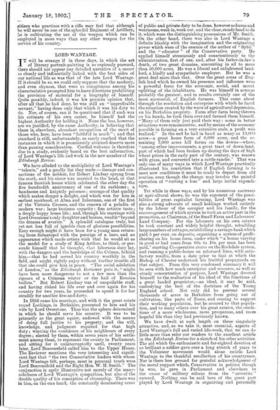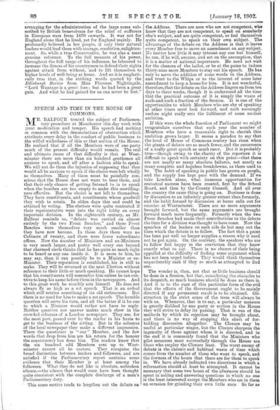LORD WANTAGE.
IT will be strange if in these days, in which the art of literary portrait-painting is so copiously pursued, there should not appear any detailed narrative of a career so closely and influentially linked with the best sides of our national life as was that of the late Lord Wantage. If it should be so, we could only suppose that the modesty, and even shyness, that were so conspicuous among his characteristics prompted him to leave directions prohibiting the provision of material for a biography of himself. Quite possibly, indeed, it was his genuine opinion that, after all that he had done, he was still an "unprofitable servant," having done only that which it was his duty to do. Nor, of course, can it be questioned that if such was his estimate of his own career, he himself had the highest Authority for holding it. None the less, however, are we justified, by the same Authority, in believing that there is, elsewhere, abundant recognition of the merit of those who, here, have been "faithful in much " ; and that standard is still, unfortunately, so rarely reached that the instances in which it is prominently attained deserve more than passinc, consideration. Cordial welcome is therefore due to a study, evidently based on the best information, of Lord Wantage's life and work in the new number of the Edinburgh. Review.
We have alluded to the multiplicity of Lord Wantage's "talents," and a goodly list they made :—lineage and con- nections of the noblest, for Robert Lindsay sprang from the stock, and his sister was married to the head, of that famous Scottish house which celebrated the other day the five hundredth anniversary of one of its earldoms ; a handsome and knightly presence ; courage of that quality which makes danger a delight, and which won for him 111 earliest manhood, at Alma and Inkerman, one of the first of the Victoria Crosses, and the renown of a paladin of modern war; large business capacity ; fine artistic taste ; a deeply happy home life ; and, through his marriage with Lord Overstone's only daughter and heiress, wealth "beyond the dreams of avarice." A splendid catalogue truly, but yet not less full of ignoble than of glorious possibilities. Easy enough might it have been for a young man return- ing from Sebastopol with the prestige of a hero, and an appearance which made artists wish that he would sit as the model for a study of Xing Arthur, to think, or per- suade himself that he thought, that Laborious duty lay, with the dangers and the hardships of the Crimea, behind him,—that he had served his country worthily in the field, and might rightly enjoy without further trouble all that she could give him in peace. "The social adulation of London," as the Edinburgh. Reviewer puts it, "might have been more dangerous to not a few men than the rigours of a Crimean winter or the hail of Russian bullets." But Robert Lindsay was of unspoilable stuff, and having risked his life over and over again for his country for two years, he proceeded to spend it for her steadily for another five-and-forty.
In 1858 came his marriage, and with it the great estate round Lockinge, in Berkshire, presented to him and his -Wife by Lord Overstone. Thus was the sphere determined in which he should serve his country. It was to be primarily as the great squire, endowed with the means of doing full justice to his property, and the will, knowledge, and judgment required for that high duty ; winning the confidence of his neighbours of every degree ; elected by them, within seven years of his settle- ment among them, to represent the county in Parliament, and sitting for it uninterruptedly until, twenty years later, Lord Beaconsfield called him to the Upper House. The Reviewer mentions the very interesting and signifi- cant fact that "the two Conservative leaders with whom Lord Wantage felt, perhaps, most in personal touch were Lord Beaconsfield and the Right Hon. W. H. Smith." The conjunction is aptly illustrative not merely of the many- sidedness of Lord Want age's sympathies, but also of the double quality of his conception of citizenship. There was in him, on the one hand, the constantly dominating sense of public and. private duty to be done, however arduous and wearisome, week in, week out, and the clear, steady head to do it, which were the distinguishing possessions of Mr. Smith. On the other hand, there was also in Lord Wantage a definite kinship with the imagination and the originating power which were of the essence of the author of "Sybil " and the " educator " of the Conservative party. He applied himself strenuously and conscientiously to the administration, first of one, and, after his father-in-law's death, of two great domains, amounting in all to more than 50,000 acres. He was a liberal and. enlightened land- lord, a kindly and sympathetic employer. But he was a great deal more than that. Over the great areas of Eng- lish land which he owned his presence and influence were a. powerful force for the economic, social, and moral uplifting of the inhabitants. He was himself in acreage probably the greatest, and in results certainly one of the most successful, of English farmers. This came about through the resolution and enterprise with which he faced the situation created by the wave of agricultural depression, on his Berkshire property. Farm after farm being thrown on his hands, he took them over and farmed them himself. "Many of them only just paid their way ; some in better situations were remunerative; and by means of the economy possible in farming on a very extensive scale, a profit was realised." In the end he had in hand as many as 13,000 acres—a great home farm of 6,000 acres, and the re- maining 7,000 acres hill farms on the downs—where, "among other improvements, a great tract of down-land, part of which had been broken up during the days of high wheat prices in the early part of the century, was resown with grass, and converted into a cattle ranche." That was only one of many ways in which Lord Wantage practically illustrated his conviction that if English farming is to meet new conditions it must be ready to depart from old routine, even though the change may involve the painful operation of "cutting a loss" and large initial expendi- ture.
Yet while in these ways, and by his numerous successes at agritailtural shows, he was the exponent of the possi- bilities of great capitalist farming, Lord Wantage was also a strong advocate of small holdings worked entirely by the labour of the occupier and his family, for the encouragement of which system he took an active part in the promotion, as Chairman, of the Small Farm and Labourers' Land Company. For the labourers on his own estates he took constant and widely helpful thought, rebuilding large numbers of cottages, establishing a savings-bank which paid 5 per cent. on deposits, organising a system of profit- sharing on his home farm, under which "a bonus varying in good or bad years from 60s. to 10s. per man has been paid," starting Co-operative stores on the Rochdale system, and running a public-house on reformed lines, with satis- factory results, from a data prior to that at which the Bishop of Chester undertook his fruitful propaganda on that subject. From this very condensed summary it will be seen with how much enterprise and resource, as well as steady concentration of purpose, Lord Wantage devoted himself to the realisation of his ideal of the functions of a great landed proprietor,—an ideal, it may be said, embodying the best of the doctrines of the Young England school. Not only did he prevent several thousands of acres in Berkshire from going out of cultivation, like parts of Essex, and ceasing to support their working population, but he secured to that popula- tion, and to many others over his great estates, the condi- tions of a more wholesome, more prosperous, and more hopeful life than they had previously known.
We have dwelt at such length on these singularly attractive, and, as we take it, most essential, aspects of Lord Wantage's full and varied life-work, that we can do little more than refer our readers to the excellent article in the Edinburgh Review for a sketch of his other activities. The aid. which the enthusiastic and far-sighted devotion of so brilliant a soldier gave over a long stretch of years to the Volunteer movement would alone entitle Lord Wantage to the thankful recollection of his countrymen. Nor is there less ground for grateful acknowledgment of the moral support which, Conservative in politics though he was, he gave in Parliament and elsewhere to the cause of military reform from the " seventies " onward. Nothing can be said here of the great part played by Lord. Wantage in organising and personally arranging for the administration of the large sums sub- scribed by British benevolence for the relief of sufferers in European wars from 1870 onwards. It was not for England alone that he lived, yet for England mainly. He profoundly believed in her people, if only their natural leaders would lead them with courage, resolution, enlighten- ment. So, while a true Conservative, he was also a most genuine reformer. To the full measure of his power, throughout the full range of his influence, he laboured to increase" the fitness of his countrymen to defend their rights against attack from without, and to _lift themselves to higher leiels of well-being at home. And so it is emphati- cally true that, in the striking words quoted by the Edinburgh Review from - Miss Florence Nightingale, "Lord Wantage is a great loss ; but he had been a great gain. And what he had gained for us can never be lost."







































 Previous page
Previous page